Catholic
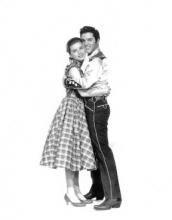
The way fans reacted to Dolores Hart’s decision to become a cloistered nun, you might have thought the movie star had announced her intention to kill herself.
Even close friends and family could not fathom why this Grace Kelly look-alike, who gave Elvis his first on-screen kiss and had her pick of acting jobs, would stow herself away in a nunnery for the rest of her life.
As if to test her resolve in those weeks before she left Hollywood, Universal Studios offered her a role opposite Marlon Brando, a role she turned down shortly after she broke off her engagement to Don Robinson, a kind and handsome businessman who loved her intensely.
On Wednesday during his weekly address, Pope Francis condemned consumerism and the "culture of waste" especially pertaining to food. Wednesday was also the day the United Nations launched an anti-food waste campaign to mark World Environment Day. The UN’s Food and Agriculture Organizatio estimates 1.3 billion tons of food are lost or wasted every year. The Washington Post reports:
“Throwing away food is like stealing from the table of those who are poor and hungry,” he said during his weekly audience in St. Peter’s Square.
Read more here.
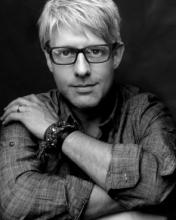
Growing up Roman Catholic in Newfoundland, Matt Maher never imagined that his childhood interest in music would lead to a career as a Grammy-nominated, chart-topping Christian rocker — let alone a crossover artist featured on Christian radio and in evangelical worship.
After he stopped going to Mass as a freshman in high school, Maher wasn’t even sure about his own faith. The idea of maintaining a personal relationship to God seemed a foreign concept.
“Where I grew up, evangelical Christianity really hadn’t made any strides,” said Maher, now 38, describing the mainline religious culture of his wind-swept Canadian homeland.
Listen to any of his catchy, guitar-driven pop-rock anthems, such as his new single, “Lord, I Need You,” and it’s clear God is never far from Maher’s mind these days.
VATICAN CITY — Gains in Asia and Africa are making up for losses in Europe among the world’s 1.2 billion Catholics, according to Vatican statistics released Monday, signaling a shift of the church’s center of gravity toward the Global South that was heralded by the election of the first Latin American pope.
Data published in the 2013 Statistical Yearbook of the Church also show that while the number of priests in the Americas and in Europe is declining compared to the overall Catholic population, those losses were offset by increasing ranks of permanent deacons.
There are now about 41,000 permanent deacons worldwide, a 40 percent increase over the past decade. The vast majority of them — 97.4 percent — live in the Americas or in Europe.
WAGS AND WISDOM
Critically acclaimed author Sue Halpern writes about experiences with her trained therapy dog, Pransky, illuminating seven classic virtues along the way, in A Dog Walks into a Nursing Home: Lessons in the Good Life from an Unlikely Teacher. A charming and insightful book. Riverhead Books
GOD AT THE BORDER
In Kinship Across Borders: A Christian Ethic of Immigration, Kristin E. Heyer develops a theological analysis, mainly rooted in Catholic thought, that examines the injustices of the current U.S. immigration system in the light of concepts of social sin, Christian family ethics, and broader policy considerations. Georgetown University Press
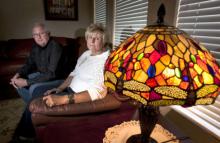
DRAPER, Utah — As young brothers, Kris, and Kourt McGuire often spent hours chasing the shimmering dragonflies that floated above a lush, green pasture behind their house.
One day, when their mom told them to come inside to clean their room, they silently obeyed — or so she thought. After a time, she went to check on the two youngest of her four sons. She found their bedroom alive with dragonflies, which they had tied with strings hung from the ceiling.
She smiled, and they all broke into laughter.
It’s one of Lyn McGuire’s favorite recollections of the two boys — a memory that predates the heartache of losing them both.
Kris died at age 8 in 1986, when a car hit him on the way to school. Kourt died about 10 years later, at age 17, killing himself amid depression and the still-stinging absence of his older brother.
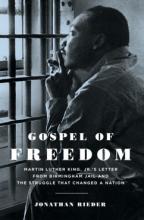
Fifty years after the Rev. Martin Luther King Jr. challenged white church leaders to confront racism, an ecumenical network has responded to his “Letter from Birmingham Jail.”
“We proclaim that, while our context today is different, the call is the same as in 1963 — for followers of Christ to stand together, to work together, and to struggle together for justice,” declared Christian Churches Together in the USA in a 20-page document.
The statement, which is linked to an April 14-15 ecumenical gathering in Birmingham, Ala., includes confessions from church bodies about their silence and slow pace in addressing racial injustice.
“The church must lead rather than follow in the march toward justice,” it says.
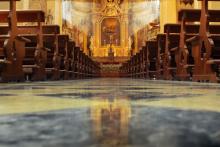
As the Senate takes up a heated debate over gun control and background checks, Catholic bishops have used the months since the Newtown school massacre to push gun control in email blasts and Senate Judiciary Committee testimony. But among the Catholic faithful, not everyone supports gun control measures.
Call them the NRA Catholics.
Books
Faith meets science
- Scientist Katharine Hayhoe and her spouse, evangelical pastor and writer Andrew Farley, gently and wisely respond to the concerns of those who deny the reality of climate change in A Climate for Change: Global Warming Facts for Faith-Based Decisions (FaithWords). An accessible exploration of the science behind climate change and the faith-based reasons why Christians can and must act.
- Ben Lowe, of Young Evangelicals for Climate Action, describes the rise of climate leadership on Christian college campuses in Green Revolution: Coming Together to Care for Creation (IVP Books).
- In Global Warming and the Risen LORD: Christian Discipleship and Climate Change (Evangelical Environmental Network), Jim Ball offers biblical and spiritual resources needed to meet the challenge.
- No Oil in the Lamp: Fuel, Faith and the Energy Crisis (DLT Books), by Andy Mellen and Neil Hollow, is part science manual, part Bible study and points toward a Christian theology for resource depletion and "peak oil." The unexpected foreword by the CEO of a top U.K. energy company adds depth.
- God, Creation, and Climate Change: A Catholic Response to the Environmental Crisis (Orbis Books), edited by Richard W. Miller, collects original essays by leading Catholic theologians and ethicists to give theological and biblical perspectives on our environmental crisis.
- Green Discipleship: Catholic Theological Ethics and the Environment (Anselm Academic), edited by Tobias Winright, is a compendium drawing on scholars from the fields of ecology, biology, history, and sociology, and includes study group aids. It also has the text of "If You Want to Cultivate Peace, Protect Creation," a January 2010 speech by Pope Benedict XVI, which can also be found at www.vatican.va.
- Sacred Acts: How Churches are Working to Protect Earth's Climate (New Society), by Mallory McDuff, looks at local churches' best practices to reverse climate change.
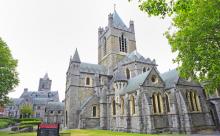
I love St. Patrick’s Day.
The one day of the year when, for better or worse, Western culture allows me to claim my non-existent inner Irishman.
Kiss me, baby.
Okay. I’m done.
There are many stories and legends about the fascinating life of St. Patrick. One of the most famous legends recounts how this great 5th century saint banished all of the snakes from Ireland. Bad snakes. Bad.
My work at the Raven Foundation during the last few years has taught me to be suspicious of such legends. In fact, we might call them myths. Myths cover up scapegoating of human beings by telling the story in a more innocuous way. So, instead of saying we banish humans, we say we banished snakes.
Interestingly, the last glacial period (some 10,000-100,000 years ago, depending on whom you ask) beat St. Patrick to the snake banishing. But, Christian tradition has given Patrick all the credit. So, if there weren’t snakes around during Patrick’s day, what’s with the legend?
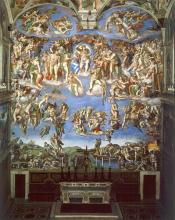
In Catholic theology, as in the popular imagination, the closed-door conclave to elect a new pope is supposed to be guided by the Holy Spirit.
There’s no horse-trading or lobbying, no insider deal-making or outside influences allowed. Just red-robed cardinals solemnly entering the Sistine Chapel, accompanied only by prayers and their consciences, sitting beneath Michelangelo’s fresco of the Last Judgment and discerning God’s will on who should be the next successor to St. Peter.
At least that’s the theory. The last millennium has shown that papal elections can be fraught with politics or worse, and can take months or even years of wrangling to reach a resolution.
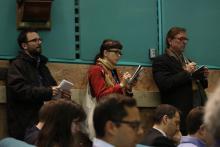
Tensions among the Roman Catholic cardinals meeting here to choose a new pope appeared to escalate on Wednesday as the American prelates in Rome canceled their daily press briefing under pressure from colleagues who are frustrated over news coverage of their secret talks.
The cardinals also announced that they still had not been able to agree on a start date for the conclave, in which 115 electors will cast their ballots for a successor to Pope Benedict XVI.
The effort to control the flow of information from the daily pre-conclave “General Congregation” meetings marked a sharp reversal from the unprecedented openness that had characterized this first papal conclave of the digital age.
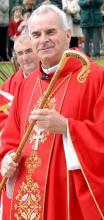
Days after pulling out of the conclave to elect the next pope and vowing to fight the charges against him, disgraced Scottish Cardinal Keith O’Brien admitted Sunday to inappropriate “sexual conduct.”
O’Brien, who until a week ago was the highest-ranking Roman Catholic cleric in England and Scotland, had served as archbishop of St. Andrews and Edinburgh for the last seven years and was made a cardinal in 2003.
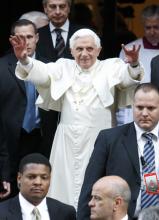
In his final public address, Pope Benedict XVI on Wednesday forcefully defended his decision to resign while trying to reassure Catholics still reeling from the shock of his unprecedented move.
For the first time since his stunning announcement on Feb. 11, the 85-year-old pope explained at length his decision to become the first pope in six centuries to resign. His tenure officially ends Thursday at 8 p.m. local time.
Benedict admitted that his resignation is a “grave” and “novel” act but, he added, his choice had been made “with profound serenity.”
“Loving the church means having the courage to make difficult, agonizing choices, having ever before oneself the good of the church and not one’s own,” he said.
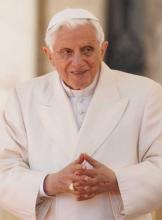
You won’t find many Catholic churches named after Pope Benedict IX.
Benedict IX squandered the papacy’s moral and financial riches in bordellos and banquet halls. His violence and debauchery “shocked even the Romans,” said philosopher Bertrand Russell, which is kind of like being busted for lewdness in Las Vegas. He was a puppet pope, installed by his powerful family at a time when rival clans ruled Rome. The young man seemed uninterested in religious life, rushing through ordination only after his election to the Throne of St. Peter in 1032.
St. Peter Damian called Benedict IX a "demon from hell in the disguise of a priest." The Catholic Encyclopedia labels him a “disgrace to the chair of St. Peter.” He was the first Pope Benedict to resign, selling the papacy for gold in order to marry. He later tried to reclaim the holy office and served three stints as pope between 1032 and 1048.
Nearly a millennium later, the pious and bookish Pope Benedict XVI seems completely contrary to his notorious namesake. Even if his papacy has stumbled at times, by all accounts the current Benedict has led a chaste life devoted to serving his church.
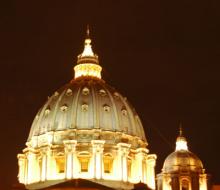
VATICAN CITY — As of 8 p.m. on Feb. 28, Pope Benedict XVI will no longer be pope and the Vatican will go into “sede vacante” mode — a Latin expression that means that the seat of St. Peter is vacant.
So who’s in charge until a new pope is chosen? The “interregnum” between two popes is governed by ancient rituals and by institutions half forgotten even within the Vatican.
But it is also the only time that the Catholic Church comes close to vaguely resembling a democracy, with the College of Cardinals acting somewhat like a Parliament with limited powers as it prepares to choose the new pontiff in a closed-doors conclave.
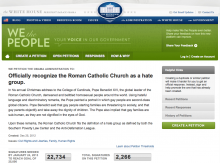
The White House’s novel online system for allowing citizens to petition the administration on any number of causes has led to various unintended consequences: petitions to secede from the U.S. following President Obama’s re-election; a petition for Vice President Joe Biden to star in a reality show; and a petition for the government to disclose its secret archives on extraterrestrials.
Now there is a petition to designate the Roman Catholic Church as a hate group for its opposition to gay rights, and it may wind up generating almost as many press releases as signatures.
The “We the People” petition was filed on Christmas Day and was prompted by Pope Benedict XVI’s Dec. 21 year-end address to Vatican administrators in which he denounced gay marriage as a threat to Western civilization.
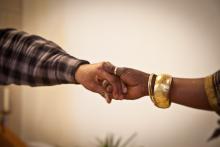
After November’s presidential vote, Catholics could cite ample evidence for their renewed political relevance while dispirited evangelicals were left wondering if they are destined to be yesterday’s election news. Yet their roles in American spiritual life may be reversed.
New research shows that Catholics now report the lowest proportion of "strongly affiliated" followers among major American religious traditions, while the data indicates that evangelicals are increasingly devout and committed to their faith.
According to Philip Schwadel, a sociologist at the University of Nebraska-Lincoln, in the 1970s there was only a five-point difference between how strongly Catholics and evangelicals felt about their religion.
By 2010, he said, that “intensity gap” had grown to around 20 points, with some 56 percent of evangelicals describing themselves as “strongly affiliated” with their religion compared with 35 percent of Catholics. Even mainline Protestants reported a higher level of religious intensity than Catholics, at 39 percent.
RICHARD VIGUERIE is as responsible as anyone for the success of the conservative movement in this country. A pioneer in political direct mail, Viguerie has been involved from the radical edges of the Right in every Republican campaign from Goldwater to Romney; he's been called the "funding father of the conservative movement." He helped start hundreds of entities from Conservative Digest to Gun Owners of America, from the National Conservative Political Action Committee to the Moral Majority—spanning the political spectrum from Right to Far Right. Just before the 2012 election, he launched MyOwnSuperPAC because of "frustration at how weak and ineffective the Romney campaign's ads have been with its soft approach to Barack Obama—hardly ever mentioning Obama's radical, neo-Marxist vision for America's future," and insisting that "Obama is NOT failing. He's succeeding at doing exactly what he set out to do—and that's destroy capitalism and destroy the America you and I grew up in." So no one is going to mistake Viguerie for a squishy liberal.
And yet Viguerie's Catholic faith has led him to a surprising position on the issues of capital punishment and prison reform. The conservative icon talked with Sojourners editor-in-chief Jim Wallis in September about why he thinks an unexpected Left-Right alliance might turn the tide against the death penalty.
Jim Wallis: As you and I both know, we're often stuck in political straitjackets. There are issues that we could work together on, particularly as people of faith, that would help politicians do better than they sometimes do. I'd like to start with this: You've said that, as a Catholic, you're against the death penalty. Why is your faith as a Catholic central to this, and how has that turned you against the death penalty?
Richard Viguerie: My own road to Damascus on this issue came many years ago. When I was a young Republican in Houston in the late '50s and early '60s, I was a very hard-core, law-and-order type: "lock 'em up, throw the key under the jail so they never get out." In those days, law enforcement agencies were kind of immune from criticism. Over a period of time, I and many other conservatives have been disabused of the fact that people in law enforcement are above any mistakes or abuse of power.
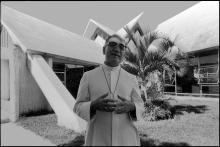
Editor's Note: The following is a poem written by Trevor Scott Barton following reading The Violence of Love by Archbiship Oscar Romero, who was assassinated in El Salvador in 1980.
Children
longing for a hero,
living love, peace and hope,
protecting ordinary people from extraordinary hatred and violence,
peaceful hero,
dying for the cause but not killing for it,
denying guns and bombs their power,
risking the violence of love.
Conserving tradition at first for the greatest,
seeing through your glasses at last for the least,
feeling the hunger of underpaid workers,
knowing the poverty of farmers,
hearing the warning, "Here's what happens to priests who get involved in politics,”
holding tears of the disappeared.
Challenging,
calling all to view the liberating body of a slain priest,
serving the poor,
using words to build up humanity and tear down injustice,
"In the name of God, stop killing ..."
offering crucifixion,
discovering resurrection.